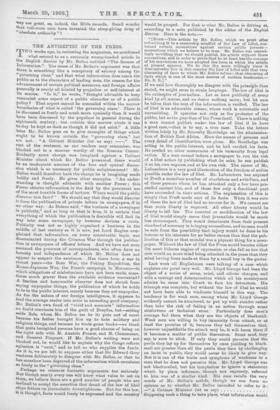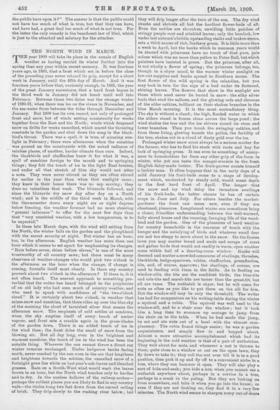THE ANTISEPTIC OF THE PRESS.
TWO weeks ago, in reviewing the magazines, we mentioned what seemed to us a curiously wrong-headed article in the English Review by Mr. Belloo entitled "The Source of Information." The sense of Ma Belloo's argument was that there is something like a conspiracy of secrecy among the "governing class," and that what information does reach the
public as to the characters of leading men, the reason for the advancement of certain political measures, and foreign affairs generally is nearly all tainted by prejudice or self-interest at its source. "Is it," he wrote, "thought advisable to keep concealed some aspect of a public character or of a public Policy P That aspect cannot be concealed within the narrow boundaries of what is called 'the governing class.' There it is discussed as freely and much more cynically than it would have been discussed by the populace in general during the eighteenth century ; but outside this narrow circle it can to-day be kept as dark as though it •did not exist." A little later Mr. Bello° goes on to give examples of things which ought to be known outside the "governing class," but are not. "A. Cabinet Minister (let us say) —." The rest of the sentence, as our readers may remember, was blacked out in a manner worthy of the Russian Censor. Evidently some charge was imagined against a Cabinet Minister about which Mr. Belloo presumed there would be an inadequate amount of the free and cynical discus- sion which is so necessary for public enlightenment I Mr. Belloo would therefore have the charge he is imagining made boldly and freely. He gives other examples. "An under- standing is thought advisable with another Power ; this Power obtains information in the field by the persistent use of the most horrible forma of torture. Where would the public discover this fact F" We should say that they would discover it from the publication of private letters in newspapers, if in no other way. As Delano said, "the business of a newspaper is publicity," and so long as that is true, it is certain that everything of which the publication is desirable will find its way into some newspaper, by however devious a route. Publicity was not so highly organised a business in the middle of last century as it is now, yet Lord Raglan com- plained that information on every conceivable topic was disseminated during the Crimean War through the publica- tion in newspapers of officers' letters. And we have not even assumed the presence of correspondents, who often have an honesty and independence of which Mr. Belloo does not appear to suspect the existence. Has there been a war in recent years—the Boor War, the Peking Expedition, the Russo-Japanese War, the French campaign in Morocco---in which allegations of misbehaviour have not been made, some- times much graver than the available evidence warranted P A. fearless and honourable observer does not shrink from saying unpopular things, the publication of which he holds to he in the pnblio interest, merely because they are unpopular. As for the nature of our foreign intelligence, it appears to lead the average reader into error in exceeding good company. Mr. Belloo's own fund of "vivid and accurate" information no doubt convinces him of the guilt of Dreyfus, but—setting aside Zola, whom Mr. Belloo (so be it) puts out of court because his father brought him up to hate military and religious things, and because he wrote gross books—we think that quite benighted persons have a good chance of being on the right side with M. Anatole France, and M. Clemenoeau, and General Pioquart. If Mr. Belloe's writing were not blacked out, he would like to explain why the Congo reform agitation is "cant," and to tell us who supplies the funds. As it is, we are left to suppose either that Sir Edward they ventures deliberately to disagree with Mr. Belloo, or that he has somehow been deprived of the information which circulates so freely in the "governing class."
Perhaps we rehearse fantastic arguments too seriously.
But though nearly every one will know what value to set on them, we believe there are a good number of people who are Inclined to accept the assertion that dread of the law of libel claps fetters on journalistic downrightness. But for this law, it is thought, facts would freely be expressed and the country
would be purged. For that is what Mr. Belloo is driving at, according to a note published by the editor of the English Review. Here is the note :—
"[Nome.—This article by Mr. Ltelloo, which we print after submitting it to a censorship mindful of the Law of Libel, Con- tained certain accusations against certain public persons— accusations which we believe to be true. Mr. Belloo was exceed- ingly unwilling that we should publish his article without these accusations, and in order to prove that he at least has the courage of his convictions we have adopted the form in which the article at present appears. We do this the more willingly since it denionstrates how in this country the Law of Libel aids that very obscuring of facts to which Mr. Bailee refers—that obscuring of facts which is one of the most serious of modern tendencies.— En. E. "
If we said how thoroughly we disagree with the principle thus stated, we might seem to strain language. The law of libel is the antiseptic of journalism. Let us have publicity of every kind by all means, and we desire nothing more; but let care be taken that the text of the information is verified. The law of libel is an admirable censor, whose work is automatic and unremitting. It operates not only as the protector of the public, but as the guardian of the Prees itself. There is nothing a man cannot publish under the law of libel if he have a good case,—that is to say, a true case. Take the letters written lately by Mr. Scoresby Rontledg-e on the administra- tion of British East Africa. Here the names of persons and every detail of identification were given. Mr. Rontledge was acting in the public, interest, and he bad verified his facts. lie needed no other assurances of his immunity from legal action. If a man cannot induce a newspaper to run the risk of a libel action by publishing what he asks, he can publish it at his own expense and at his own risk. The career of Mr. Labouchere is a very good illustration of the freedom of /Lotion poesible under the law of libel. Mr. Lehi:ember° has exposed in Truth a countless number of charlatans and swindlers, and of those persons whom he has attacked only a few have pro- ceeded against him, and of these few only a fractional part have succeeded in their actions. The explanation of this is simply that Truth made sure of its facts. When it was sure of those the law of libel had no terrors for it. We cannot see that more liberty • is required. All other liberty would he liberty to tell lies. The removal or modification of the law of libel would simply mean that journalists would be much less circumspect. They would deteriorate from their present standard of accuracy in bringing accusations, and no man would be safe from the passibility that injury would be done to his honour or his interests for no better reason than that the pub- lication of this or that scandal was a piquant thing for a news- paper. Without the law of libel the Press would become either the most hideous engine of oppression or else fall so low that men would no more mind being attacked in the press than they mind having faces made at them by a small boy in the gutter.
Last week all Englishmen were talking of a case which explains our point very well. Mr. Lloyd George had been the object of a series of mean, cruel, and odious charges, and with a courage and determination which all his countrymen admire he came into Court to face his detractors. His triumph was complete, but without the law of libel he would not have been able to vindicate himself in this way. The tendency is for weak men, among whom Mr. Lloyd George evidently cannot be numbered, to put up with slander rather than take the risk of failing in an action through some misfortune or technical error. Particularly does men's courage fail them when they are the objects of blackmail. Weak men are willing to buy immunity from attack, or at least the promise of it, because they tell themselves that, however unjustifiable the attack may be, it will harm them if it becomes a matter of public discussion. Some mud, they say, is sure to stick. If only they could perceive that the perils they lay up for themselves by once yielding to black- mail are greater than all the perils they dam by challenging an issue in public, they would never be likely to give way. But it is one of the traits and symptoms of weakness in a man that he does not perceive this. Mr. Lloyd George was not blackmailed, but his temptation to ignore a statement which by plain inference, though not expressly, referred to him was of a similar kind. His case recalls the very words of Mr. Belloo's article, though we can form no opinion as to whether Mr. Belloo intended to refer to it
—"A Cabinet Minister (let us say) Supposing such a thing to take place, what information would the public have upon it P" The answer is that the public could not have too much of what is true, but that they can have, and have had, a great deal too much of what is not true. For the latter the only remedy is the beneficent law of libel, which is just to the attacked and salutary for the attacker.











































 Previous page
Previous page